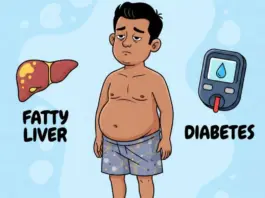Even the fittest and leanest bodies can hide a secret enemy. Diabetes in young adults doesn’t always wait for age or extra pounds to strike. Muscles, clean diets, and early morning runs might not guarantee safety when hidden genes quietly sabotage blood sugar balance. Understanding how genetics tips the scales reveals why health alone cannot always prevent this invisible risk.
Fit, Lean, and Still at Risk — The Shocking Truth
Even if you are active, maintain a slim figure, and eat clean, diabetes can strike unexpectedly. Experts warn that genetic factors often override lifestyle advantages, making diabetes in young adults a growing concern.

The pancreas may struggle to produce enough insulin even in healthy-looking individuals. Small amounts of abdominal fat can worsen insulin resistance. Understanding these hidden risks is essential to prevent complications before they arise.
Why the Myth of ‘Only Obese Get Diabetes’ Falls Apart?
Diabetes in lean individuals challenges the assumption that only obesity or aging causes high blood sugar. Studies reveal that even fit people can inherit genes that impair insulin production or beta-cell function.
Family history plays a decisive role: if parents or grandparents had diabetes, the risk escalates significantly. This evidence shows that diabetes in young adults can emerge silently, independent of visible body weight or lifestyle choices.
Silent Killer Within — Experts Decode the Genetic Mystery
A 32-year-old patient was shocked when diagnosed despite strict exercise and diet routines. “My parents and grandparents have diabetes. Is it because of my family history? What more should I do to control my blood sugar?” he asked.
Experts explain that family history strongly influences diabetes risk. Even thin individuals may develop high blood sugar if genetic factors weaken pancreatic function. Understanding your hereditary risk allows you to take proactive measures and monitor blood sugar more diligently.
The Genetic Puzzle — How Hidden Genes Trigger Disease
Genetic causes of diabetes can silently influence pancreatic performance, insulin sensitivity, and beta-cell efficiency. Certain variants increase the likelihood of early-onset diabetes, even when lifestyle is optimal. Hidden mutations may cause diabetes in young adults without classic warning signs.
Recognizing the role of genetics clarifies why some fit and lean individuals experience rapid blood sugar spikes, reinforcing the importance of combining lifestyle vigilance with awareness of inherited risks.
Beyond Obesity — Who Faces the Hidden Genetic Threat
Lean, active, and otherwise healthy young adults may unknowingly carry diabetes-predisposing genes. Individuals with a strong family history or early exposure to stress have elevated risks. Even small amounts of abdominal fat can accelerate insulin resistance.
Those maintaining normal body weight should remain attentive to blood sugar levels and family history. Diabetes in fit people is not rare, and early detection through regular checkups is crucial to mitigate silent progression and long-term complications.
Smart Prevention — What Young Adults Should Do Now
You can take charge despite genetic risk. Monitor fasting glucose and HbA1c levels regularly, maintain a balanced diet, exercise consistently, and manage stress. Building lean muscle through strength training improves insulin sensitivity.
Understanding family history helps identify hidden risks early. Discipline in sleep, nutrition, and lifestyle acts as a shield against genetic triggers. Proactive measures reduce the chances of complications from diabetes in young adults and fit individuals.
Diabetes can affect young, lean adults due to genetics. Awareness, monitoring, and lifestyle vigilance are essential to control blood sugar and prevent severe long-term complications.
Disclaimer: This content, including advice, provides general information only. It is not a substitute for a qualified medical opinion in any way. The methods and claims mentioned in this article should be considered as suggestions only; DNP India neither confirms nor denies them. Always consult a doctor before following any such suggestions/treatments/medications/diets.




